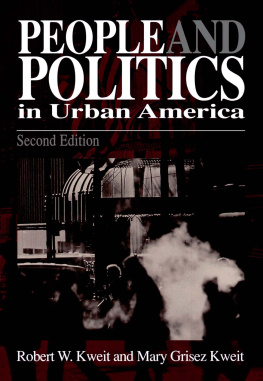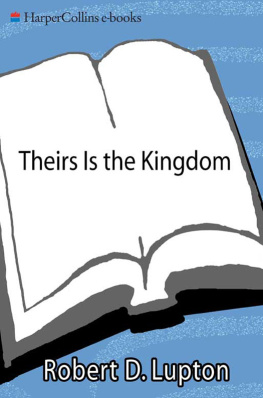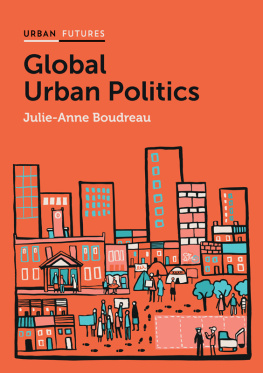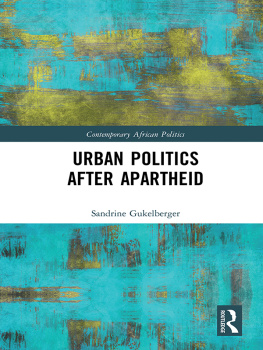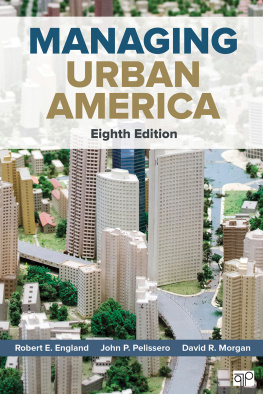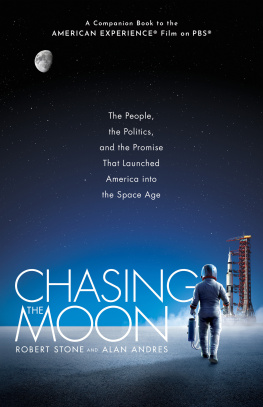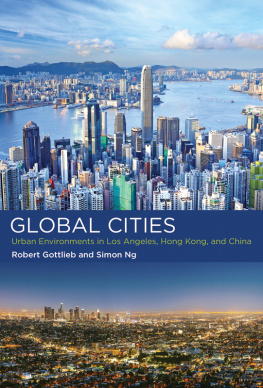First published 1999
by Garland Publishing, Inc.
Published 2013 by Routledge
2 Park Square, Milton Park, Abingdon, Oxon OX14 4RN
711 Third Avenue, New York, NY 10017 USA
Routledge is an imprint of the Taylor & Francis Group, an informa business
Copyright 1999 by Robert W. Kweit and Mary Grisez Kweit
All rights reserved
Library of Congress Cataloging-in-Publication Data
Kweit, Robert W.
People and politics in Urban America / Robert W. Kweit, Mary Grisez Kweit. 2nd. ed.
p. cm. (Garland reference library of social science; v. 1147)
Includes bibliographical references and index.
ISBN 0-8153-2607-6 (case: alk. paper). ISBN 0-8153-2606-8 (pbk.: alk. paper)
1. Municipal governmentUnited StatesCitizen participation. 2. Urban policyUnited StatesCitizen participation. 3. Political participationUnited States. I. Kweit, Mary Grisez. II. Title. III. Series.
HT123.K9 1999
320.8'5'0973dc21 98-6537
CIP
America's cities are anomalies. On the one hand, they house some of the greatest human accomplishments: museums that are full of artistic masterpieces, symphony halls that showcase musicians, dancers, and other performers, buildings that are architectural and technological marvels. On the other hand, those same cities also are home to human despair and depravity. People live in decayed and rat-infested buildings. Many, living in a drug-fogged world, prey on others for money to support their habits. Approximately 75 percent of Americans live in our cities and surrounding suburbs, and the characteristics of those cities inescapably affect the quality of their lives. This book examines the extent to which these Americans use the political process to control the characteristics of life in their metropolises.
Some reviewers saw the draft of the first edition of People and Politics in Urban America as a heretical work when it was first reviewed in 1988. At a time when the dominant paradigm in the field of urban politics was based on the assumption that politics was subservient to the inexorable forces of economic imperatives, the draft asked the question, "How can citizens use the political process to affect the quality of life in today's American cities?" The authors, both political scientists, felt that question was legitimate and found reason for its legitimacy in political science research that focused on the role of citizen participation in political processes at the urban level.
The final manuscript melded the political science literature on the impact of participation with the urban literature that focused on reasons why the impact of participation must be seriously constrained by economics. It attempted to use both literatures to provide a balanced assessment of the possibilities and the limitations citizens face in attempting to control the urban environment. As the manuscript went to press, others in the urban field were publishing books that proclaimed that "politics matters," and new research began to appear that lent support to that claim. Researchers have now developed a body of literature that examines variation among cities in the nature of governing coalitionsor "regimes"and concomitant variations in the role that various interests in the city, including major economic interests, play in decision-making.
The discipline has now accepted the position that allows for a more thorough discussion of the interdependence of politics and economics. While this makes People and Politics in Urban America less unique, the authors believe that these developments vindicate the thrust of the initial book. The revision addresses two basic questions: How can leaders put together a successful governing coalition? How can citizens impact the political process?
Clearly both questions are important to an understanding of urban politics. This revision attacks both questions by dealing more thoroughly than the initial edition with the urban political process as an interaction between political leaders attempting to form governing coalitions and citizens who need access to those coalitions to achieve their goals. It relies upon the concept of agendasetting to bridge the individual and systemic perspectives. Leaders want to assemble a governing coalition to advance their agenda issues, but also use issues as a means of appealing to potential coalition partners. Citizens want their concerns to be on the agenda, and use various means either to become part of the coalition or to become a force that the coalition must consider.
This revision places greater emphasis than the first book on the role of political leaders, but it recognizes the interdependence between those leaders and various interests in the city. It draws upon the recent researchespecially that examining the formation and transformation of governing coalitions in various cities. It examines the resources that citizens can use to become part of the coalition.
This version, however, retains the focus on the theme of democracy in the city and the importance of it for the citizens of the city. These issues are concerned from both an empirical and a normative perspective. The book retains many of the subjects addressed in the original text, although slightly reorganized, updating them by discussing current research and current events. Two areas most affected by the impact of current events are the discussion of the ethnic composition of the city and the discussion of the political changes occurring at the national level.
The original text examined the impact of the immigrants of the late nineteenth and early twentieth centuries and the impact of the more recent immigrants, identified as "blacks and Hispanics." The revised text includes discussion of these groups and moves the discussion of the early immigrants to the second chapter. It also includes an expanded examination of the increasing heterogeneity among blacks and Latinos, as well as the increasing importance of Asian-Americans and Asian immigrants in many cities.
Several events at the national level have had substantial implications for cities. The push to "reinvent government" has loosened the federal regulatory strings on state and local government, supposedly producing greater efficiency and effectiveness at all levels of government. Such a change may also be expected to create greater variation across cities in the implementation of many policies. The new Republican majority in Congress has transformed many federal transfer payments from categorical to block grants, thereby allowing greater variation in the way cities implement policies, and also greater variation in the policy mix of various cities. Because of the increased importance of local government management and innovation, a new chapter highlighting new urban management reforms has been included.
Chapters are arranged in four sections. The first part focuses on the urban context in which policymaking occurs. examines how issues are raised and placed on the agenda and how policy to deal with the issues is formulated. The third part looks at policy adoption, implementation, and evaluation. The final part examines various policy areas within this framework that are important in the urban setting.



